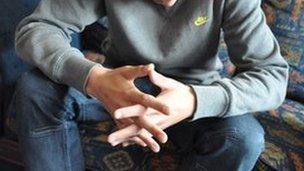Problem families helped by intensive support, research suggests
- Published

The family intervention services target about 50,000 families with troubled children and young people
Families with multiple problems are being helped to turn their lives around with intensive support, research released by the government suggests.
Among families in England who had been on intervention programmes, there was a fall in anti-social behaviour, truancy and domestic violence.
Other new research says that for every £1 spent on family programmes, £2 is saved in costs to state.
Children's Minister Tim Loughton says lives are being turned around.
"Today's statistics show an overwhelmingly positive picture of how intensive family intervention can successfully turn around the lives of families who have many complex problems, often present for generations within the same family," he said.
In family intervention programmes, families with a range of problems are given help from various agencies, through a single "key worker".
The problems might be social, economic, or related to health or behaviour and are often a mixture of all of these.
Long-term problems
The Prime Minister David Cameron last month said he wanted to expand the model, which was developed under Labour.
And in December he appointed Emma Harrison as a "family champion" to lead a drive to get workless families back into employment, using a similar system.
At the time, she said there were thought to be 125,000 "troubled families" where no one had ever worked and that a lot of social problems stemmed from them.
Two sets of research published on 14 September deal with programmes aimed at tackling long-term family problems.
Official statistics show that in the financial year 2010-2011, a total of 5,461 families were on the family intervention programme, including about 2,000 who were still being worked with from previous years.
In the year to April, just over 3,400 families had accepted an offer for the service.
To try to measure how successful the schemes have been, statisticians looked at the 3,675 families who had left the intervention services since January 2006.
They say they found among these families there had since been a 58% reduction in anti-social behaviour, a 53% reduction in truancy, a 57% reduction in domestic violence and a 34% fall in child protection issues.
However, the researchers pointed out that without further study, they could not say whether the improvements were directly due to the family intervention service.
"Some change amongst families might occur 'naturally' over time or because of other services or interventions families received", the report said.
The second study published, in to the similar Family Pathfinder scheme, found "significant improvement in outcomes" for nearly a half (46%) of families supported by the scheme.
Researchers said for every £1 spent, the Family Pathfinders saved the state £1.90.
- Published14 September 2011
- Published15 August 2011